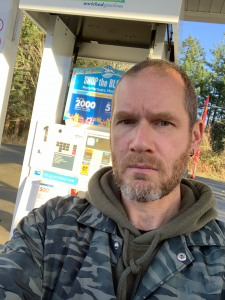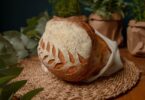Brett Josef Grubisic
Using a plastic tool, Mother had demonstrated the art of peeling a navel orange four breakfasts in a row. I’d understood in about a second. Slice, slice, slice, slice. “There’s a technique to it too,” she told me. “From north pole to south in one precision movement. Then repeat.”
“Longitude, never latitude,” Mother said. “Take that to your Mr. Snikes.” My teacher had the special power, she’d decided, to curdle milk with his sour outlook. She thought learning should be fun, an adventure.
But after the first lesson, watching her slide the blade’s tip slowly toward the navel wasn’t fun.
Hip against the sink, she held up the orange in the light of a cloudy school morning. Posing. She’d learned that at department store Christmas shifts—shoppers appreciated perfume spritzers with inviting mannequin poses. But never bulldozers. “‘No customer wants to be threatened with a scent,’” Mother had repeated in the whispery voice of her old boss.
“Don’t worry, you’ll get your turn,” Mother winked. “The thing’s sharper than it looks. You don’t think they hand out scalpels in the first hour of medical school, do you?”
Mother felt absolutely smitten, she said, by the yellow plastic gizmo.
When setting out the scissors and materials for a new craft or opening a parcel, she’d mention how she’d always been the type to get seized by passions. She didn’t seem super-happy about it—more like she was saying she was left-handed or had a million freckles and couldn’t change.
Her passions never lasted, though. They didn’t stick. Classes for exercise in a swimming pool, selling houses, auto mechanics, pottery and candles. A week of salty bean stews named cassoulets. Mother pored over classified ads for home business opportunities, wondered aloud about what course she might teach at River Bend’s community centre.
This week she’d been quizzing and quizzing me about the five remaining squares of yellow snipped from magazines and taped to the wall. She stirred my porridge, which she’d told me had kept pioneers alive. She’d also taught me how colours influence people. Blue was soothing, she said, while yellow wakes up our minds.
Eventually, she intended to present the hardware-store man with the keeper and say, “One gallon in this exact shade, please.” The winner, I’d heard, needed nuance and subtlety day and night across all four seasons. “Eating here with walls slathered in butter, the very thought. Or hot dog mustard, for that matter. Can you imagine,” Mother asked.
Ideas for fresh wallpaper and paint seized Mother according to the phase of the moon. She could appreciate her own madness, she joked, meaning that others couldn’t and should be treated with kid gloves. That meant carefully.
Mother called the saying “Keep them guessing” words to live by.
“For once, that air-headed woman is really onto something,” she’d said about our neighbour. Usually known as The Ninny Next Door, Mrs. Alfonsi was born in Sweden and married to a grey-haired man she met on a Mediterranean cruise. Even though Mr. Alfonsi wore a tie, he worked night shifts at the sawmill.
To sell plastic lettuce holders and leftovers containers Mrs. Alfonsi held parties with coffee cake or drove to other neighbourhoods with a trunk of merchandise. Usually, Mother called it junk.
Mrs. Alfonsi had handed each lady an orange peeler as a token of her appreciation, Mother had reported on Sunday. As a kindness, Mother put in an order for a set of six.
“It’s sheer elegance.” She slid a plate in front of me, a flower of orange-segment petals with a purple grape heart.
Mother started buying red net bags of oranges because her clothes were dropping hints for her to lose a few. I’d heard her on the phone.
She’d yanked the cord around the corner and held the fruit over the sink. “Avoid a mess when you can,” that’s one of her all-purpose sayings. “It’s the grapefruit diet, give or take. There’s a natural chemical in the pulp that burns fat…No, I can’t be more specific. I left my book of chemical formulas at the lab. Jeez. Anyhow, it just attacks fat. Knocks it senseless.”
Mother hated grapefruit. “Cannot abide the stuff,” she said.
◊ ◊ ◊
Except for pudding, Mr. Snikes allowed a snack at recess. “Out, out,” he ordered, pushing open the creaky fire-exit doors even when puddles grew into lakes and we all huddled under the overhanging roof at the stairs.
With us he acted the same as a dog trainer. “Sit.” “Stand up.” “Quiet.” “No.”
At “Okay” he permitted our return to the building.
Mr. Snikes always stepped inside for fourteen minutes. Kids guessed out loud, saying he smoked or used the bathroom or made time with Miss Barclay across the hall in Grade 6. Once, I snuck inside for my raincoat and saw him reading a newspaper. He’d loosened the brown striped tie he wore but glared from his desk and stabbed his pointing finger toward the rear door.
On Monday’s recess I found a present in my lunch kit. One of the scalpels Mrs. Alfonsi had sold to Mother was wrapped in a paper towel.
The twins who punched the tether ball at recess and lunch hour stopped to look. “What are you using that for?”
“My mother gave it to me.” Standing over me, they kept silent. I added, “It’s sheer elegance.” That answer made their mouths pucker and eyes squint for just a second.
“C’mon,” they said to each other and ran for the playground.
Mr. Snikes made the twins sit two rows apart because of their disruptive influence. “Enough,” he boomed when Mikey or Marky began to get out of hand, which was about six times before lunch hour. He shot glares at one or the other every few minutes. I liked when he’d tap his temple to remind them he could read minds filled with schemes.
Mr. Snikes glared at me a lot too. Whenever I raised my hand. If I dropped an eraser. When my pencil tip broke and I rushed to the sharpener across from his desk.
Sometimes, I felt pretty sure I could read his mind. “You’re a pain,” I thought he’d like to tell me.
“The man’s a bully,” Mother would say, slicing a banana for my sandwich. “Plain and simple. There’s at least one in every room. But you’ll leave for junior high and he won’t. Remember that.”
Other days, she decided I needed thicker skin. “You were born small. It’s an uphill battle.”
◊ ◊ ◊
Last month Mr. Snikes made a morning announcement. He had half a mind to shake things up, zig when they expected him to zag. When he said “they,” he always meant the principal. He told us we’d need to see the bigger picture when we got older but didn’t tell us Grade 7ers what zig was. Or zag.
The mental fitness regime for the autumn of 1983, he’d said to us right after lunch, would start with reports spoken at the front of class. They’d give us something useful to do at home on downpour weekends. Mr. Snikes believed TV turned brains into mush.
He began with a word he chalked on the board in capital letters: ACRONYM.
“Make it two minutes. Not over, not under,” Mr. Snikes said. “Tell us what the letters stand for and what your acronym reveals about society.” With “Pencils ready,” he spoke letters and double-tapped on the desks where they belonged.
I spelled KP, FLQ, WAC, SDIO, DRV, KGB, AIDS, MIA, and VIP in my notebook. Mr. Snikes gave surprise quizzes to keep our minds sharp and said “Expect the unexpected.”
At my desk, he said “ICBM.” I underlined my assignment.
By the water fountain afterwards, Mikey or Marky called me a VFG. I asked Ralph what that meant, but he didn’t know. I guessed the twins made it up. The twins snickered everywhere, hissing “CAF” at popular girls. Carolina Zinelli got “UAF,” but she’s popular.
Mother decided the assignment sounded valuable. She thought Mr. Snikes’ track record was spotty, which sounded the same as “Room for improvement.” Mr. Snikes wrote that in other kids’ report cards.
She told me nerves were normal when facing a crowd and joked that I could pin on a diaper if I thought I’d actually pee my pants.
At home, liquor store boxes crammed with old toys, clothes, and what Mother called ancient history almost reached the roof of the carport on the passenger door side and one wall of the rumpus room. That’s where she’d stacked my old diapers.
She put “GS” on the boxes with a black marker. That way, the “Xmas” ones wouldn’t get carried to the driveway and sold.
Mother got seized by the garage-sale plan in springtime. By summer she joked about lighting a huge bonfire instead.
◊ ◊ ◊
For our next project Mr. Snikes wrote GENERAL KNOWLEDGE.
He wandered down my aisle and said our assignments while knocking on desks, right then left. “Bermuda Triangle” to Darren C and “The Treaty of Versailles” for Carolina Zinelli. Darren Mc got “The Voyageurs.” For Ralph—called Rajpal by Mr. Snikes and a magnet for glares on the days he fidgeted—“How about the Easter Islands?”
He rapped on my desk and said a mouthful. I printed Fulg…? + Bat…? That could be anything—a battle or a country or a world event. Mr. Snikes had told us a few times that world events had a way of sealing a man’s fate.
He’d taught us cordillera, which meant mountain range, so I guessed my topic could be like that.
Before walking home, I approached his desk with its stacked dictionaries and folders. He kept a jam jar of mints and a blue can of peanuts behind them.
Getting closer, I felt chicken. I wanted to say he’d spoken too quickly, but Mr. Snikes disliked kids supposing they knew better than him. He’d also explained that failure to listen amounted to a cardinal sin.
“Can you spell my presentation topic?”
“Can I?”
“May you? Will you?”
“And?”
“Please, thank you, sir.”
I zipped my pencil case and polished the top with my sleeve.
He sighed, eyes shooting toward the ceiling. “Beware the tidy child, Evan,” he said. “Boys especially. Fas-tid-i-ous. Look it up and run in the opposite direction.”
Mr. Snikes stood up and wrote on the blackboard: FULGENCIO BATISTA. He gave me the recess wave after I printed the words. It meant move along, get out.
Fulgencio. I pictured a volcano. Coloured chalk would be handy for that.
At home Mother had taken down one of the yellows and left it on the kitchen table. She’d judged the fourth runner-up as neither this nor that. “In case you’re wondering,” she said, scooping it up and making it into confetti at the garbage can.
“Oh, your father sends his love,” she added in a fake sing-song voice. That was all he ever sent. He always called after I left for school.
He’d stayed for another job in Alaska, Mother told me in the summer, for the good of the family. Way after—we were kneeling on newspapers carving jack-o’-lanterns—she said some men weren’t built for family life.
I nodded and smiled when she said I could visit him one day. I wished he’d get a job in Australia. Kangaroos are better than blizzards.
Mother explained that Fulgencio was the first name of a criminal, a real piece of work in Cuba who’d died. The rest, she smiled, would require a trip to the library. “Presenting for how many minutes,” she asked. Nodding, she decided that Mr. Snikes had become quite the taskmaster.
I couldn’t tell if that equalled good, bad, or something else.
◊ ◊ ◊
After I returned to my desk, Mr. Snikes listed the shortcomings. I’d managed to overlook the man’s stints in Florida, the Dominican Republic, and Spain, he said.
He cut off my “But” with “Time. Management. Learn it well.”
Karen Overton had gotten VERTIGO and talked about a confusing old movie where there’s reincarnation and a lady who has to dress the same as a dead lady. The drawings on the board didn’t help Karen at all.
Mr. Snikes made her take a new GENERAL KNOWLEDGE because she’d reported on the wrong subject. “Try again,” he said. Karen told him her assignment hadn’t been specific enough and he gave her the two-finger point. Principal’s office, it meant. Back talk. That was a cardinal sin too.
When Mr. Snikes wrote FOREIGN VOCABULARY he announced that the last presentation before Christmas had to be longer, plus handed in as a report with an illustrated title page. He added NATURAL SCIENCE to the blackboard and warned us, “Something interesting, okay, not lava or the bloody solar system. Try getting creative.” Kids had to come up with their own topics.
CAVEAT EMPTOR. SCHADENFREUDE. BETE NOIRE. CUI BONO? With the wooden pointer, Mr. Snikes swatted countries on the world map. He wrote AD OGNI MORTE DI PAPA, turned the pointer to me, and then jabbed Italy. Mr. Snikes didn’t know about Mr. and Mrs. Alfonsi. Mother told me they missed Italy in every way except the bum economy.
“You’re in elementary school, not Harvard,” Mother said when I explained our final assignment before the Christmas holiday.
“He said ‘interesting’? ‘Interesting’?! Does he think he’s Commodus?” Mother had checked out a library book about Roman emperors and told me a few of what she called exploits. They’d murdered their wives a lot and sounded crazy.
◊ ◊ ◊
On Saturday Mother drove us to the big mall. She made a joke about needing an afternoon off before building our ark. We passed by flooded corn fields. Ducks paddled around the grey stalks and hunted bugs.
At the food court she allowed herself a black coffee and gave me carte blanche, which I knew from Ralph’s presentation. I got a bear claw and hot chocolate.
For NATURAL SCIENCE Mother kept thinking up ideas for bean seeds, potatoes or yams. I should try growing them, she said, under extreme conditions. “Like the vacuum of space but at room temperature,” she suggested. Making a vacuum required special equipment, though. She had one plan about homemade amber and another about peas, but they confused me.
I thought of a tidal wave and an earthquake. Each one was okay to start with but needed to make a strong impression. If Ralph told me to shake sand or water in a baking pan, I’d say, “No way, Jose.”
Whenever Mr. Snikes saw so-so creativity he’d say, “Satisfactory, barely. Half-assed. Just know that minimal effort won’t get you far in life.”
“That’s rich, coming from him,” Mother said when I told her.
A book in the living room showed the Sea of Serenity on the moon. I pictured using paper-maché and painting in craters and mountain ranges. I could create a section as curved as an orange-peel segment, from north pole to south.
Mother nodded and said, “Well, there’s definitely possibility in that idea” in a way that made me believe she thought the opposite.
When I asked if she’d packed other science books in garage-sale boxes, she said, “Don’t worry, it’ll come to you.” She always promised that about inspiration.
On the mall’s bottom floor we passed by Club Maz-a-tan, a store next to a long hallway that led to restrooms. The teenager in front wore a grass skirt over jeans and a yellow T-shirt with an iron-on of a sunset beneath TEQUILA in orange fuzzy letters. With each bottle of sun-tanning oil the size of a baby finger she handed out a coupon. She gave off a coconut smell.
Inside, I spotted a hut with a straw roof next to the cash register. Christmas lights outlined the hut’s entryway.
The machine inside was a display unit, the girl said. She made a hand movement like a clam opening and closing. Paying customers used sunbeds in the back rooms so they could put on bathing suits and lock doors for privacy.
The girl had no tan at all but told Mother a deep healthy glow could be achieved in mere minutes. She had long black hair and wore two barrettes shaped like skeleton hands.
Mother tucked the coupon inside her purse. “What’ll they think of next.”
Moving up the escalator, she told me about a movie where people in the future lived under domes. When they got sick of their faces, they flipped through a catalogue at a boutique and ordered brand new ones. The surgeon used a spider-armed machine that shot laser beams.
◊ ◊ ◊
In my room at home I used my 2H pencil to trace the outline of a penny in the middle of the page. That would become the moon. In the upper right corner, I ran the tip along a section of a tomato can to stand for the sun. The sun is hundreds of times bigger than the moon, and Mr. Snikes told us science relies on accurate measures. Below the moon, I drew a silly snowman face that I’d change to mine later. Arrows meant light rays, which shot from the sun to the moon and ended at the face. I sketched MOONTANNING, A REPORT along the bottom in two rows of futuristic letters.
The sun in orange, the moon in grey, and half my face in tanned skin colour would stand out against a black background. The arrows would be either silver or orange. Usually, I kept my cerise pencil crayon for titles.
Mr. Snikes had told us our projects should aim to confirm a hypothesis. If Karen wanted to prove that rabbits laid eggs, he said, she’d need verifiable evidence to prove it.
He explained that for hundreds of years people had thought Earth was the centre of the solar system because the high and mighty made it the law. Everybody from kings to farmers had been wrong, but we weren’t now because of better evidence.
Mr. Snikes also said some people had believed the earth was flat because of faulty evidence, only they refused to admit it.
That meant people could say 2 + 2 = 5 if they had evidence.
“It’s a miracle we haven’t blown ourselves up,” Mr. Snikes said, then moved on to Language Arts.
For a hypothesis, I thought of the idea that sunlight reflected by the full moon could tan skin after several hours. As proof I’d use my face. I’d get a tan line by blocking half of my face in the Club Maz-a-tan machine.
That would be creative and make a major impression.
I’d ask the girl at the mall to help. She looked like she didn’t care about rules all that much. Mr. Snikes said we didn’t get to pick and choose which rules to follow.
No one in River Bend had opened a sunbed shop, and that was good and bad. Under the good column, Mr. Snikes wouldn’t ever think Moontanning = Evan + Sunbed. He might swoop down to see if my tan was actually makeup, but he’d only find strong evidence of a moon tan.
For the plan, the bad column stretched down far. I’d have to take a bus in secret by myself to a mall in another town for the first time and also tell Mother I’d walk to the library on Saturday and work on my project until closing time. I’d need to ask for money and sneak the coupon out of her purse.
After the tanning machine, I’d fib again when she saw my half-glowing face. All I could come up with was a wind burn. If Mr. Snikes thought I’d made fake evidence, he’d call her at home for a meeting. She’d never lie to him, so she couldn’t know the truth.
The last line on the list made me frown. The weather page in the newspaper showed that the moon would be almost full on the weekend, which was good, but with clouds and rain. If the moon didn’t shine for a long while, everyone would be able to tell I’d made up the whole project.
I folded my list and title page in half and then in half again over and over until the lump could fit into the palm of my hand. Moontanning looked the same as an uphill battle. I threw the papers, evidence of my abandoned project, into the kitchen garbage and asked Mother about the recipe for amber.
For the project I dug up two earthworms by the knobby old Brussels sprout plant in the garden. I rinsed one. Mother put the other directly in the oven and I watched it shrink into dirty string on the pan. For the display, which was black velvet glued on a Christmas card box, I pinned the baked worm to a cork coaster.
Mother made amber in a pot. After it cooled enough in the plastic dome mold she dropped in the clean worm. With tweezers she shaped the worm into a spiral.
Without air, which is mostly oxygen, decomposition nearly stops. That was the hypothesis. My title page showed an hourglass, but instead of sand inside I drew a dried-up worm on the bottom and a plump fresh one inside amber on the top. I decided to paint futuristic letters in silver for THE HIDDEN FACE OF OXYGEN, A REPORT.
Kids showed tremors, earthquakes, and tidal waves on the fold-up tables from storage. The twins did a family tree of twins, and Mr. Snikes said F because they were two people, not one. Ralph’s proved that building houses on a fault line was asking for trouble.
Mr. Snikes held my amber to the light. “A for ingenuity,” he said, “but I’m keeping my eye on you.”
 Brett Josef Grubisic resides on Salt Spring Island and teaches at UBC. He’s published four novels: The Age of Cities, This Location of Unknown Possibilities, From Up River and For One Night Only, and Oldness; Or, The Last-Ditch Efforts of Marcus O.
Brett Josef Grubisic resides on Salt Spring Island and teaches at UBC. He’s published four novels: The Age of Cities, This Location of Unknown Possibilities, From Up River and For One Night Only, and Oldness; Or, The Last-Ditch Efforts of Marcus O.






